I’ve struggled with sleep issues before, feeling like I was stuck in a cycle of wakefulness. But I found ways to help myself sleep better. This article will share those tips to help you sleep faster and better.
Key Takeaways
- Understand the basics of sleep and why good sleep is key.
- Stick to a regular sleep schedule to keep your body’s clock in check.
- Make your bedroom sleep-friendly by controlling the temperature, light, and noise.
- Try relaxing before bed with deep breathing and muscle relaxation.
- Learn how mindfulness, meditation, and therapy can improve your sleep.
Understanding Sleep: The Fundamentals
Quality sleep is key to our health and happiness. By exploring sleep science, we learn why it’s vital and how to sleep better.
The Importance of Quality Sleep
Good sleep is crucial for our bodies and minds. It helps our cells repair, our immune system get stronger, and our brains make memories and learn.
Not getting enough or good sleep can lead to problems. We might think less clearly, make poor choices, have a weaker immune system, and be at risk for diseases like obesity, diabetes, and heart disease.
Circadian Rhythms and Sleep Cycles
Our sleep patterns are linked to our circadian rhythms. These are our internal clocks that control many body functions. They’re affected by light, temperature, hormones, and other factors.
Knowing about circadian rhythms and sleep cycles helps us improve our sleep habits. By matching our daily life with our natural rhythms, we can sleep better and feel better overall.
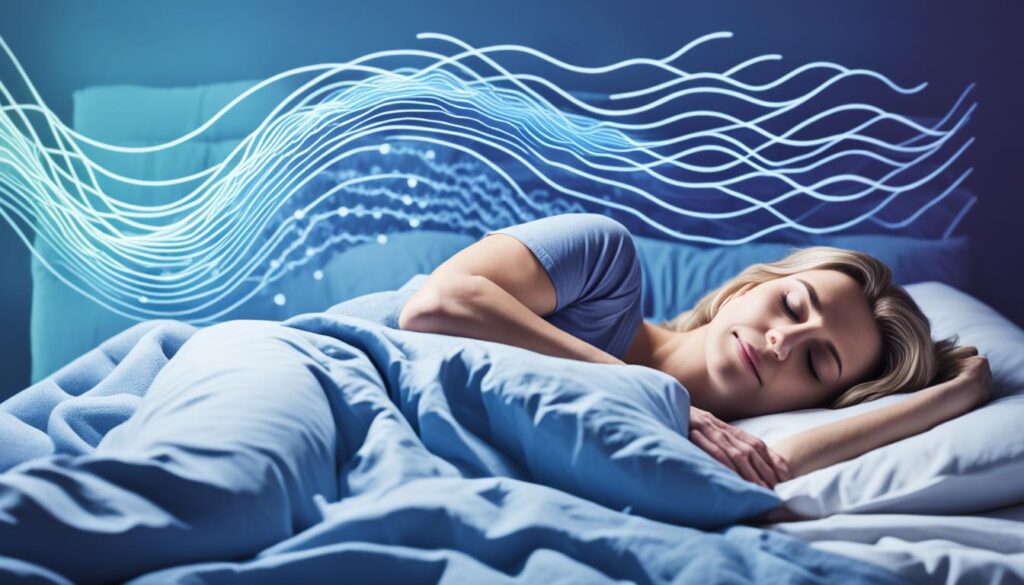
“The most important thing is to try to listen to your body’s natural rhythms and work with them, rather than against them.”
| Key Aspects of Circadian Rhythms | Impact on Sleep |
|---|---|
| Light exposure | Regulates the production of melatonin, the sleep-promoting hormone |
| Body temperature fluctuations | Influences the timing and quality of our sleep-wake cycles |
| Hormone secretion (e.g., cortisol, melatonin) | Affects our ability to fall asleep, stay asleep, and wake up refreshed |
Establish a Consistent Sleep Schedule
Keeping a regular bedtime routine is key for good circadian rhythms and quality sleep. Going to bed and waking up at the same time every day helps your body clock work better. This leads to better sleep quality and length.
Having a regular bedtime routine tells your brain it’s time to sleep. This can include relaxing activities like taking a warm bath, reading, or stretching. Doing these things every night helps your body get ready for sleep faster.
- Set a consistent bedtime and wake-up time, even on weekends.
- Engage in relaxing activities 30-60 minutes before your designated bedtime.
- Avoid stimulating activities, such as using electronic devices or watching TV, close to bedtime.
- Adjust your sleep schedule gradually, rather than making drastic changes.
- Expose yourself to natural light during the day to help regulate your circadian rhythms.
| Consistent Bedtime Routine | Inconsistent Bedtime Routine |
|---|---|
| Falling asleep faster, better sleep quality | Difficulty falling asleep, poor sleep quality |
| Improved daytime alertness and energy | Daytime fatigue and decreased productivity |
| Synchronization of circadian rhythms | Disruption of circadian rhythms |
By sticking to a consistent bedtime routine, you can use your body’s natural circadian rhythms to get better sleep and feel better overall. Being consistent is important for good sleep habits.
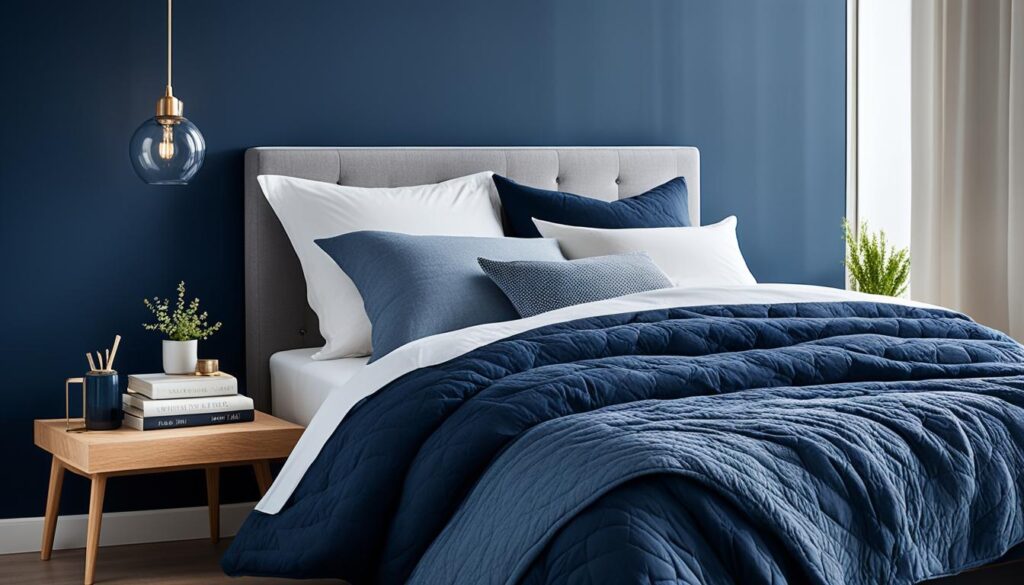
Create an Optimal Sleep Environment
Creating the right sleep space is key to getting good sleep. Focus on temperature, lighting, and noise to make a sleep-friendly area. Let’s see how to make your bedroom a sleep haven.
Temperature and Lighting
The best bedroom temperature is between 65°F and 70°F (18°C to 21°C). A cooler room tells your brain it’s time to sleep. Also, less bright light helps keep your sleep cycle in check and improves sleep quality.
Noise and Clutter
Too much noise and clutter can mess with your sleep. Use white noise machines or earplugs to block out sounds. Keep your bedroom tidy to help your body relax for sleep.
| Sleep Environment Factor | Optimal Conditions |
|---|---|
| Temperature | 65°F to 70°F (18°C to 21°C) |
| Lighting | Dim, avoid blue-wavelength light |
| Noise | Quiet, use white noise if needed |
| Clutter | Organized, free of distractions |
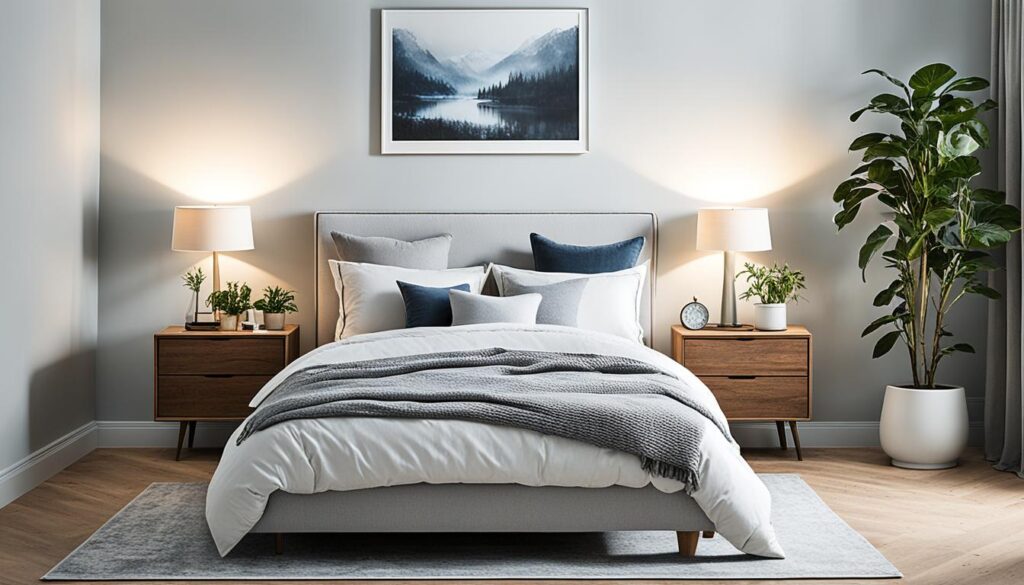
By making your sleep space better, you’re setting up for a restful night. Focusing on these factors can greatly improve your sleep and health.
Practice Relaxation Techniques
To get a good night’s sleep, adding relaxation techniques to your bedtime routine helps a lot. Deep breathing and progressive muscle relaxation are great methods. They calm your mind, ease body tension, and get you ready for sleep.
Deep Breathing Exercises
Deep breathing is easy yet effective for relaxation. Focus on your breath and breathe deeply and slowly. This activates your body’s rest response, lowering your heart rate and stress. It makes falling asleep easier.
- Find a quiet spot to sit or lie down.
- Inhale slowly through your nose, letting your belly expand.
- Hold your breath, then exhale slowly through your mouth.
- Do this for 5-10 minutes, focus on your breathing.
Progressive Muscle Relaxation
Progressive muscle relaxation means tensing and relaxing muscles in your body. It helps reduce tension, making it easier to sleep.
- Start with your toes and feet, tense and release them.
- Move up to your legs, hips, abdomen, chest, arms, and face.
- Tense each group for 5-10 seconds, then relax for 20-30 seconds.
- Notice how each muscle feels tense and then relaxed.
Using relaxation techniques, like deep breathing and progressive muscle relaxation, before bed is great. It prepares your body and mind for quality sleep.
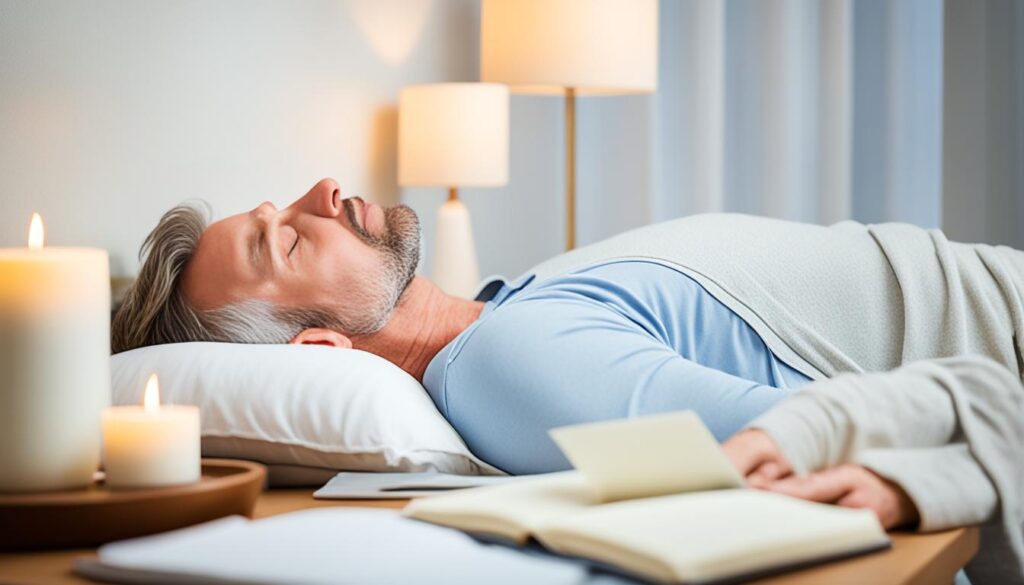
fall asleep fast, sleep tips, sleep hacks, better sleep, insomnia solutions
Getting a good night’s sleep is key for our health and happiness. If you find it hard to fall asleep or stay asleep, there are ways to help. We’ll share some top tips and hacks to make your sleep better.
One way to sleep faster is to stick to a regular sleep schedule. Sleeping and waking up at the same time every day helps your body get into a rhythm. Also, doing something calming before bed, like stretching or reading, tells your brain it’s time to sleep.
Also, make your bedroom sleep-friendly. Keep it cool, dark, and quiet for better sleep. Soft sounds, like white noise or nature sounds, can also help block out disturbing noises.
| Sleep Tip | Description |
|---|---|
| Establish a Consistent Sleep Schedule | Going to bed and waking up at the same time every day can regulate your body’s circadian rhythms. |
| Create a Relaxing Bedtime Routine | Engage in calming activities, such as light stretching or mindfulness exercises, to signal your body it’s time to sleep. |
| Optimize Your Sleep Environment | Maintain a cool, dark, and quiet room to create the ideal conditions for falling asleep quickly. |
Using these sleep tips and sleep hacks can help you sleep better. Everyone is different, so try different things to see what works for you.
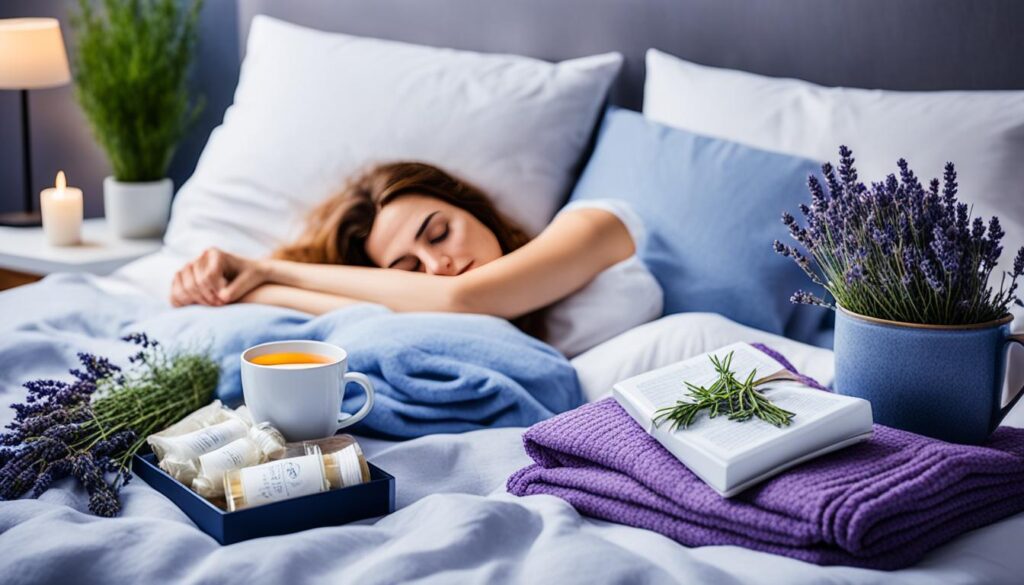
Mindfulness and Meditation for Better Sleep
Getting enough sleep is key for your health and happiness. Mindfulness and meditation can help improve your sleep. By adding these practices to your daily life, you can sleep better and feel refreshed.
Guided Imagery and Visualization
Guided imagery and visualization are great for better sleep. They let you create peaceful mental pictures to relax your mind and body. Imagine a calm place to take your mind off daily stress and get ready for sleep.
- Picture yourself in a peaceful place like a quiet beach or forest.
- Use all your senses to make the picture vivid.
- Breathe deeply and let the calmness fill you, letting go of worries.
Adding mindfulness and meditation to your visualization can make it even better for sleep. Focus on now and let go of thoughts to relax deeply. This can help you sleep better.
| Technique | Benefits for Sleep |
|---|---|
| Mindfulness | Reduces stress and anxiety, leading to improved sleep quality. |
| Meditation | Promotes relaxation and can help you fall asleep faster. |
| Guided Imagery | Calms the mind and body, creating a sense of tranquility for sleep. |
| Visualization | Engages the senses and transports you to a peaceful, sleep-inducing state. |
Using mindfulness and meditation techniques like guided imagery and visualization can help you sleep better. By finding calm and relaxation, you can get a restful night’s sleep.

Cognitive Behavioral Therapy for Insomnia
For those with chronic insomnia, cognitive behavioral therapy (CBT) is a powerful tool. It targets the thoughts and behaviors that make sleep hard. This therapy offers a lasting fix, not just a quick relief.
CBT-I focuses on changing negative thoughts and habits that keep sleep issues going. It uses cognitive and behavioral methods to help people:
- Spot and fight negative sleep thoughts, like worrying too much about not sleeping well.
- Start good sleep habits, like going to bed and waking up at the same time every day.
- Manage stress and anxiety that can ruin sleep.
- Stop behaviors that mess with sleep, like lying awake in bed for too long.
Cognitive behavioral therapy for insomnia doesn’t just mask the problem like sleeping pills do. It digs deep to find the real causes of sleep issues. By changing how the mind and body see the bedroom, CBT-I can help you take back control of your sleep. This leads to better sleep quality over time.
“Cognitive behavioral therapy for insomnia is considered the gold standard treatment for chronic sleep problems.”
If you’re having trouble sleeping, think about trying CBT-I. This tailored therapy, often given in one-on-one sessions with a trained therapist, can break the cycle of sleep anxiety. It helps you get back to healthy, restful sleep.
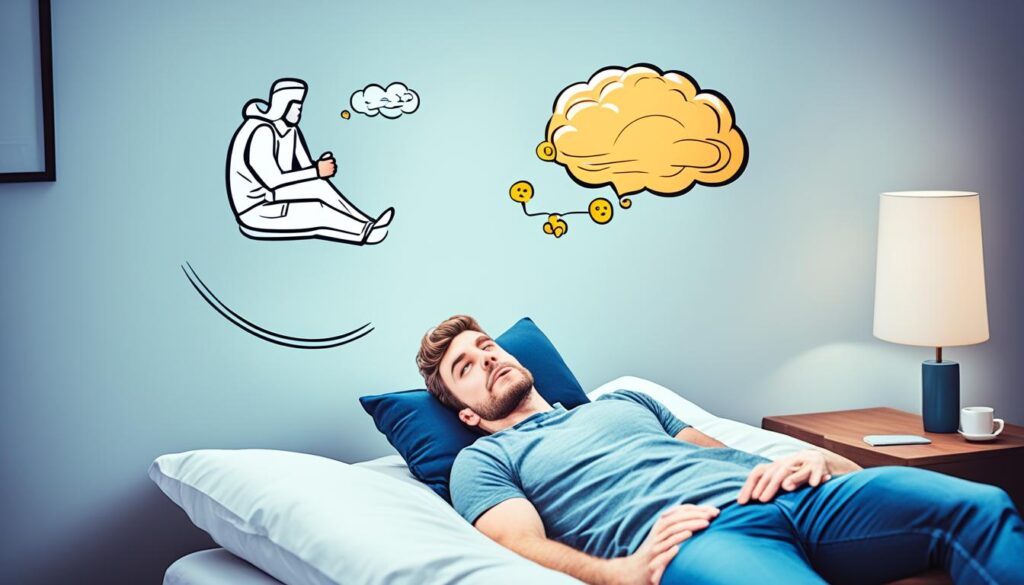
Sleep Hygiene: Healthy Habits for Better Rest
Good sleep hygiene is key for quality sleep. Simple lifestyle changes can help you sleep better and wake up refreshed. Focus on cutting down screen time before bed and avoiding stimulants and heavy meals.
Limiting Screen Time Before Bed
Electronic devices like smartphones and computers emit blue light. This light can mess with your sleep cycle. It lowers melatonin, the hormone that helps you sleep. Try to avoid screens for at least 30 minutes before bed.
- Charge your devices outside of the bedroom to reduce temptation.
- Consider using an e-book reader with a low-blue light display instead of a backlit tablet.
- Engage in relaxing activities, such as reading a physical book or practicing gentle stretches, to wind down before bed.
Avoiding Stimulants and Heavy Meals
Stimulants like caffeine or nicotine close to bedtime can mess with your sleep. Heavy meals can also make it hard to sleep. Being careful with what you eat can help you sleep better.
- Limit caffeine intake to the morning or early afternoon hours.
- Avoid consuming large or fatty meals within a few hours of your desired bedtime.
- Stay hydrated throughout the day to support your overall sleep hygiene.
Adding these simple sleep habits to your daily life can greatly improve your sleep. Healthy habits lead to better sleep, making you feel refreshed and energized.
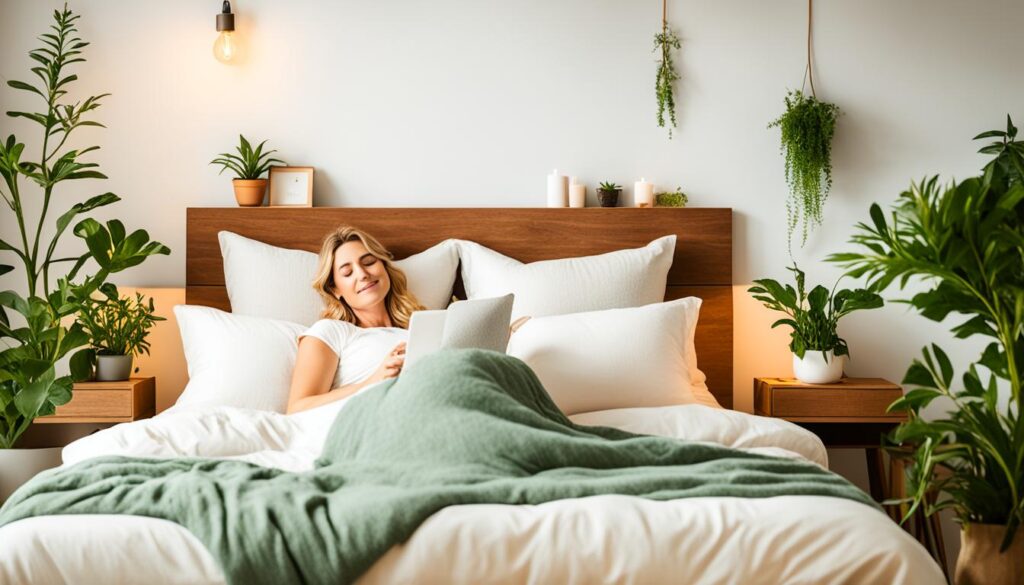
Nutritional Supplements for Sleep Support
Many people are now using nutritional supplements to help with sleep problems. These supplements can be used along with lifestyle changes to improve sleep. We will look into supplements that can help you sleep better and what research says about them.
Melatonin is a well-known supplement for sleep. It’s a hormone that helps control our sleep cycles. Studies show it can make falling asleep faster, especially for those with sleep issues or jet lag. But, always talk to a doctor before starting any supplements.
Magnesium is another supplement that helps with sleep. It helps manage stress and can make you feel more relaxed. It’s good for people with insomnia or stress-related sleep problems.
| Supplement | Potential Benefits | Recommended Dosage |
|---|---|---|
| Melatonin | Regulates circadian rhythms, reduces time to fall asleep | 0.5-5 mg before bedtime |
| Magnesium | Promotes relaxation, improves sleep quality | 300-500 mg daily |
| Valerian Root | May improve sleep onset and quality | 300-900 mg before bedtime |
Remember, supplements can help with sleep, but they shouldn’t replace other treatments. Always talk to a healthcare professional before adding new supplements to your routine.

“Developing a comprehensive sleep support strategy that includes both lifestyle modifications and targeted supplements can be a highly effective approach for improving sleep quality and overall well-being.”
Addressing Sleep Disorders
Creating good sleep habits can greatly improve sleep quality. But sometimes, sleep problems can mean there’s a sleep disorder. It’s important to know and treat these conditions for restful sleep.
Obstructive Sleep Apnea
Obstructive sleep apnea is a common sleep issue. It happens when the airway blocks during sleep, stopping breathing. Symptoms include loud snoring, gasping, and feeling tired during the day. If not treated, it can lead to serious health issues. So, getting medical help is key.
Restless Leg Syndrome
Restless leg syndrome makes you want to move your legs because they feel uncomfortable. This can make falling and staying asleep hard, causing sleep loss. The cause is not fully known but might be related to brain chemicals.
If you think you have a sleep disorder, see a doctor for help. They can diagnose and treat you with things like CPAP machines for sleep apnea or medicine for restless leg syndrome.
| Sleep Disorder | Symptoms | Potential Causes | Treatment Options |
|---|---|---|---|
| Obstructive Sleep Apnea | – Loud snoring – Gasping or choking during sleep – Daytime fatigue | – Blocked airway during sleep | – Continuous Positive Airway Pressure (CPAP) device – Oral appliances – Lifestyle changes |
| Restless Leg Syndrome | – Irresistible urge to move the legs – Uncomfortable sensations in the legs – Difficulty falling and staying asleep | – Imbalance of neurotransmitters in the brain | – Medications – Lifestyle changes – Supplements |
Understanding and treating sleep disorders helps improve sleep and overall health. Getting advice from a doctor is important for the right diagnosis and treatment. This leads to better sleep and daily life.
Stress Management for Improved Sleep Quality
Stress and anxiety can really hurt our sleep. When our minds won’t stop racing, it’s hard to relax and sleep well. Luckily, we can use strategies to manage stress and sleep better.
Relaxation Techniques
Practicing relaxation techniques is a strong way to fight stress and sleep better. Some top methods are:
- Deep breathing exercises
- Progressive muscle relaxation
- Guided imagery and visualization
- Mindfulness meditation
Adding these to your daily life can calm your mind and body. It gets you ready for sleep.
Cognitive-Behavioral Strategies
Cognitive-behavioral strategies also help with stress and sleep. This method helps you change negative thoughts that cause stress. By thinking differently and coping better, you can stop stress from keeping you awake.
| Stress Management Technique | Impact on Sleep Quality |
|---|---|
| Deep Breathing | Reduces physiological arousal, promoting relaxation and faster sleep onset |
| Cognitive Behavioral Therapy | Addresses the underlying cognitive and behavioral factors contributing to insomnia |
| Mindfulness Meditation | Improves focus, reduces rumination, and enhances the ability to fall and stay asleep |
Using these stress management techniques daily can greatly improve your sleep quality and overall health.
“The quality of your sleep is directly related to the quality of your life. Effective stress management is crucial for achieving the restful, restorative sleep we all need.”
Exercise and Physical Activity for Better Sleep
Regular exercise greatly improves the quality of our sleep. Adding exercise and physical activity to our daily life brings many benefits. These benefits help us sleep better and improve our overall sleep quality.
Exercise makes us feel more awake during the day and helps us sleep better at night. It releases endorphins, which reduce stress and anxiety. These are big factors in insomnia and poor sleep. Plus, it makes us tired in a good way, helping us fall and stay asleep.
There are many physical activities that can help our sleep, like running, cycling, strength training, and yoga. Finding the right balance and timing of exercise is key for our individual needs and preferences.
The Optimal Timing for Exercise
When we exercise can also affect how it helps us sleep. Experts say to do moderate-to-vigorous exercise in the morning or afternoon. This lets our body cool down for the best sleep temperature. Exercising too close to bedtime can keep us awake, as it keeps our energy and body temperature up.
| Exercise Timing | Impact on Sleep |
|---|---|
| Morning or Afternoon | Promotes better sleep at night |
| Late Evening | May disrupt sleep due to increased energy and body temperature |
Finding the right exercise balance and timing helps us use exercise to improve our sleep and health. Adding regular physical activity to our daily life is a simple way to better our sleep and support a healthier lifestyle.
Developing a Bedtime Routine
Creating a bedtime routine can greatly improve your sleep hygiene and help you fall asleep faster. A predictable set of activities before bed tells your body it’s time to relax and get ready for sleep.
Here are some tips to help you develop an effective bedtime routine:
- Set a consistent bedtime: Pick a bedtime that lets you get 7-9 hours of sleep each night. Stick to it, even on weekends.
- Engage in relaxing activities: Add calming activities like light stretching, reading, or a warm bath to your routine. They help your body and mind relax.
- Limit screen time: Don’t use electronic devices like smartphones, tablets, or computers an hour before bed. The blue light from screens can mess with your sleep cycle.
- Practice mindfulness: Add a short meditation or deep breathing exercise to your routine. It helps calm your mind and body.
- Keep it consistent: Always follow your bedtime routine, even on weekends or when your schedule changes. This keeps your sleep hygiene strong and your sleep-wake cycle healthy.
By having a consistent and calming bedtime routine, you train your body to link these activities with sleep. This makes falling asleep faster and enjoying more restful nights easier.
“Consistency is key when it comes to developing a healthy bedtime routine. By sticking to the same sequence of activities each night, you’re reinforcing your body’s natural sleep-wake cycle.”
Conclusion
Improving your sleep quality is a journey worth taking. It starts with understanding sleep basics and setting regular routines. By using proven techniques, you can beat insomnia and enjoy deep, restful sleep.
This article has given you many tools to improve your sleep and health. From quick ways to fall asleep to detailed sleep hacks, you now have what you need. Use these tips and hacks to start sleeping better and feeling great.
A good night’s sleep is essential for your health. By focusing on sleep and using the advice in this article, you can sleep better and overcome insomnia. Start using these sleep tips and hacks for a more rested, refreshed, and productive life.
Sweet dreams, and here’s to a lifetime of better sleep!

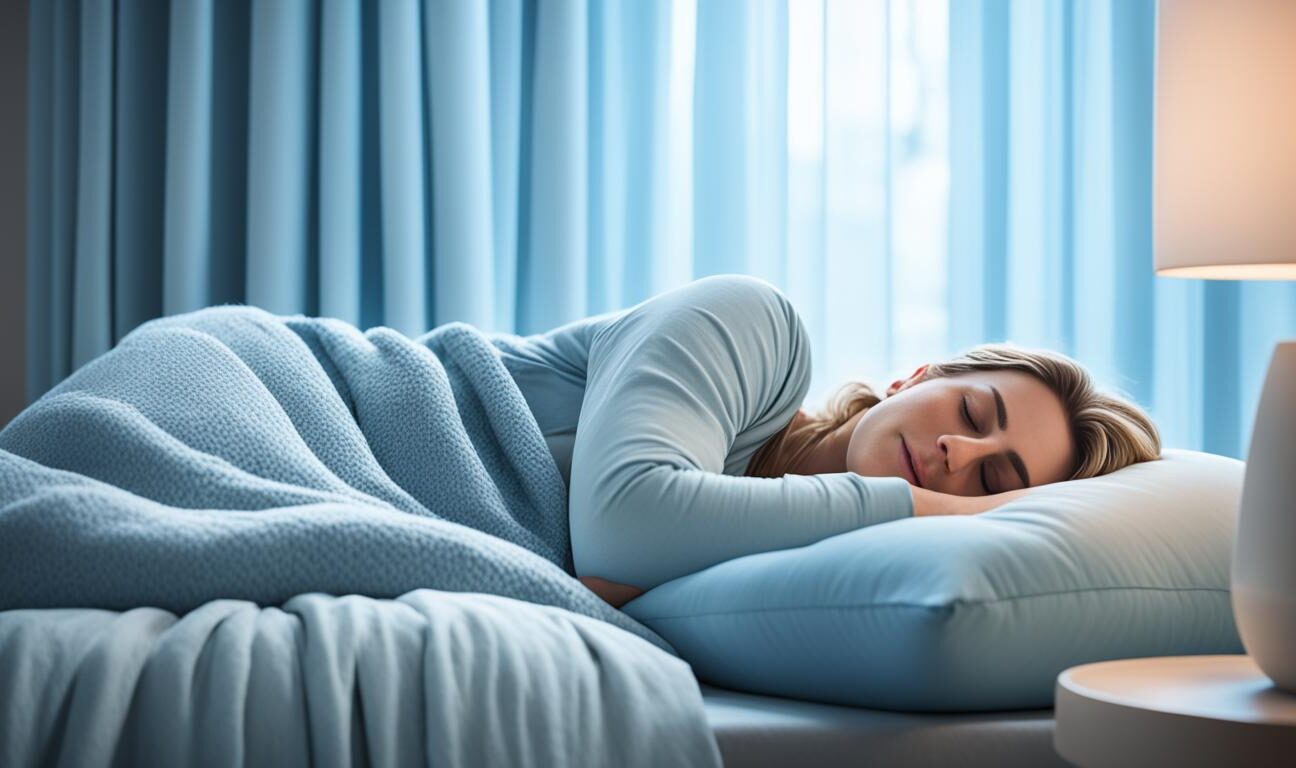



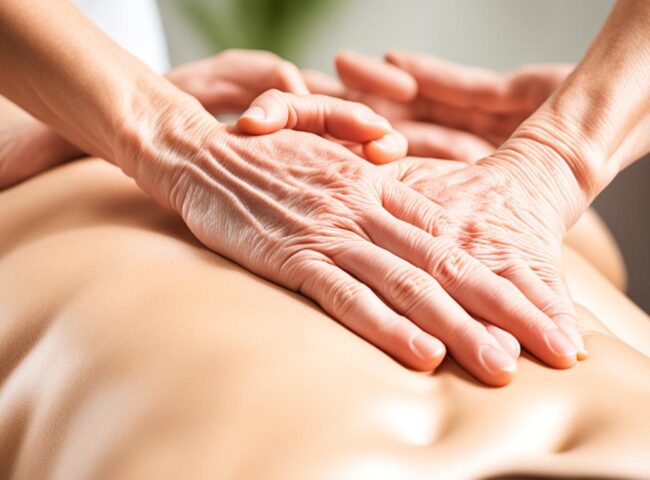

Leave feedback about this